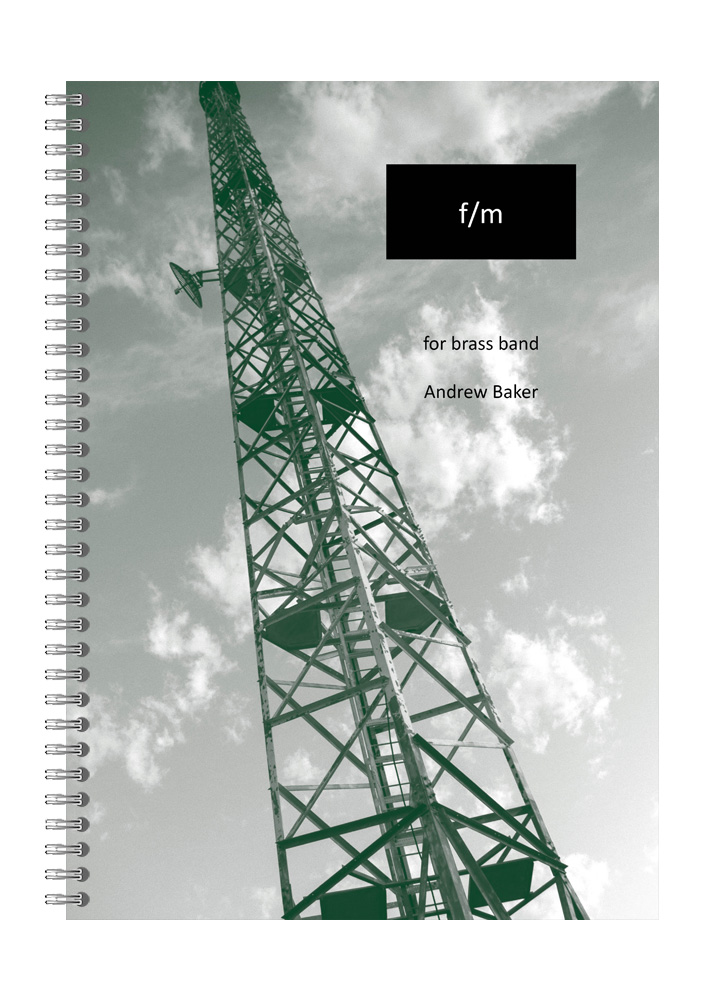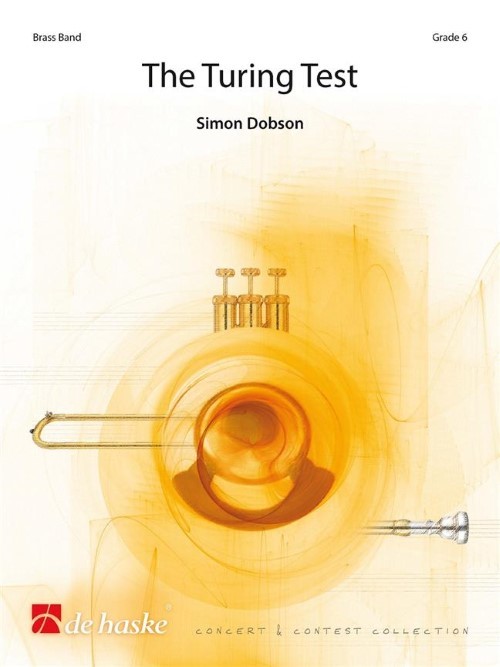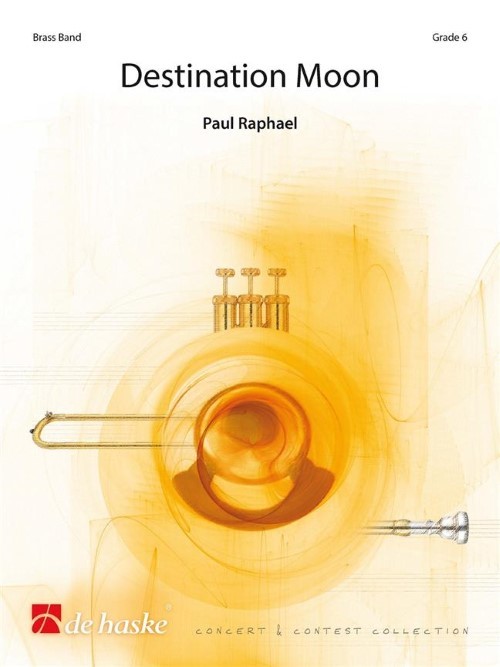Results
-
 £34.95
£34.95Aristotle's Air - Christopher Bond
The Ancient Greeks believed that there were four elements that everything was made up of: earth, water, air and fire. This theory was suggested around 450 BC, and was later supported and added to by Aristotle. The idea that these four elements - earth, water, air and fire - made up all matter was the cornerstone of philosophy, science, and medicine for two thousand years. Air was considered a 'pure' element, but in fact the air that's all around us is made up of a variety of gasses. Of course, in music, air has a different meaning; a beautiful song-like melody or tune and Aristotle's Air is just that. The work was commissioned by and written for The Cory Band as part of their winning 2015 Brass in Concert programme 'The Four Elements of the Universe', being premiered at the contest at The Sage, Gateshead, on 15th November 2015. The work was awarded the Cyril Beere Memorial Trophy for the Best New Composition or Arrangement.
Estimated dispatch 5-10 working days
-
 £45.00
£45.00strange geometry
Descriptionstrange geometrywas commissioned by Morgan Griffiths and the Hammonds Saltaire Band for their performance at the Brass in Concert Championships of 2015.As a bit of a space/sci-fi geek, as well as a musician, two events during the summer of 2015 had a particular effect on me. The first was the tragic early death in a plane crash of the famous film composer James Horner. Horner's music, particularly in films like 'Star Trek II: The Wrath of Khan', 'Avatar', 'Apollo 13' and even his debut in Roger Corman's 1980 budget film 'Battle Beyond the Stars', defined for a generation the sound of sci-fi at the cinema. Along with John Williams he created the vocabulary for those who wish to express other-worldly wonder in music and his inventive talent will be much missed in an industry where originality has become something of a dirty word in recent years.The second event was the epic flyby of Pluto by the NASA New Horizons spacecraft. There are many reasons to find this mission inspiring - for example, the scientists and engineers behind it created a craft that has travelled at 37,000 mph for nine years and three billion miles to arrive within seventy-two seconds of the predicted time for the flyby. That they achieved this with such accuracy is an outstanding tribute to humanity's ingenuity and insatiable curiosity. However, the most exciting aspect of the mission was the clear, high resolution pictures of this unthinkably remote and inhospitable world beamed back to mission control. The best previous image of Pluto was an indistinct fuzzy blob - suddenly we could see mountains made of ice, glaciers of methane and carbon monoxide and nitrogen fog - features previously unimagined on a world thought to be a slightly dull ball of cold rock. The BBC's venerable astronomy programme 'The Sky at Night' waxed lyrical about these newly discovered features, referring to "the surprising discoveries of mountains and strange geometry on the surface of this cold distant world".I like to think that Horner would have been as inspired as I have been by this real-life science story, and this piece uses some of the vocabulary of the sci-fi movie soundtrack in a tribute to the memory of a great musician and to the inspirational geeks at NASA who have boldly taken us where no-one has gone before.Note: This work comes with a B4 portrait score. Listen to a preview and follow the music below!Performance Notes:The cornet section should play this piece standing up in a roughly semicircular arrangement around the outside of the band facing towards the audience, starting with solo cornets 1&2 to the conductor's left (roughy behind the normal repiano cornet seat) then 2nd cornets, repiano, soprano, 3rd cornets and finishing with solo cornets 3&4 standing roughly behind the normal 2nd trombone seat. If time and logistics permit, the trombones should occupy the first three solo cornet seats, although this is optional. A suggested band layout (with percussion) is given here.Solo cornets 1&2, repiano cornet, 2nd cornets, 3rd cornets, flugel, solo and 1st horn, 1st baritone and euphoniums will require fibre straight mutes - ideally NOT metal ones. Soprano cornet, all solo cornets, 3rd cornets and all trombones will require cup mutes - ideally the cornet mutes should be the adjustable cup type and these should have the cup adjusted quite tight to the bell to give a 'closed' sound. Soprano cornet, solo cornet 3&4 and repiano cornet will require harmon mutes - TE indicates 'Tube Extended', TR indicates 'Tube Removed'. Soprano and repiano cornets will also require metal straight mutes. Vibrato should only be used very sparingly throughout, and never in muted passages.Percussion Requirements:Percussion 1: tubular bells, concert bass drum (not a kit pedal drum), tam tam, clash cymbals, 3 x tom toms, 1 x suspended (clash) cymbal and snare drum.Percussion 2: vibraphone (bowed and with mallets), bass drum and tam tam (shared with perc. 1), additional suspended (clash) cymbal and snare drum.Percussion 3: glockenspiel, 4 x timpani (ideally 23", 25", 28" and 30")Approximate duration 5'50"
Estimated dispatch 7-14 working days
-
 £45.00
£45.00f/m
Descriptionf/m was inspired by the internet cartoon 'frequency' by the artist Randall Munroe, which can be seen atxkcd.'Frequency' displays a grid of randomly chosen statistical events which flash at the frequency of their real-time occurrence; an outwardly banal idea with surprisingly profound results. f/m (which - predictably - is short for frequency/modulation) takes a similarly random set of time/duration statistics and uses them to generate the note lengths for each instrument. The first four statistics (and the first brass instrument entries) are derived from physical science. The next eight are all related to the natural world. The final ten, for which the cornets are used, represent contemporary human activity. The percussion instruments maintain a "tick and chime" throughout the work. To view a PDF preview of the score click here.The statistics used are as follows, indicated by numbers in brackets in the score at the first iteration of each one:Lightning strikes the earth 100 times per secondThe first pulsar ever discovered, PSR1919+21, pulses once every 1.337 secondsThere are approximately 10 supernovae every 0.95 secondsEvery 0.6 seconds the entire solar system moves 100 miles around the galactic centreEvery 4.1 seconds a 70 kg human emits 1000 gamma rays due to naturally occurring potassiumA blue whale's heart beats once every 6.67 secondsA hedgehog's heart beats 300/min or 5 times a secondEvery 2 seconds the net population of the world increases by 5There is one birth every 0.24 secondsThere is one death 0.56 seconds5.14 people die of malaria every minute ( one every 11.67 seconds)10 kilotonnes of polar ice are lost on average every 1.4 seconds.Walmart's takes in sales revenue of $10,000 every 1.4 secondsEvery 3 seconds there are 60,000 plastic bags used in US supermarketsEvery 0.72 seconds the world uses 500 tonnes of paperEvery 7.65 seconds, South Korea builds a carEvery 1.75 seconds, China builds a carEvery 5.8 seconds, Germany builds a carEvery 4.7 seconds, the USA builds a truckTwo commercial airline flights take off every 1.86 secondsMacdonalds serves 300 burgers every 4 seconds and feeds 787 people per secondStarbucks uses 3 gallons of milk every secondPerformance Notes:All entries are cued by the conductor at his/her discretion. There is no specified minimum or maximum time between entries and no specified overall duration; the times between each new entry do not have to be consistent unless the conductor wishes them to be so. However each player should be allowed time to complete at least one iteration of their note, and preferably to become comfortable with their place in the overall texture - one of the aims of the work is try present dissonant sounds through the medium of the brass band outside the normal performance context, allowing players to find their place in a non-diatonic harmonic matrix without regard for linear motion or developmental activity. Entries should not coincide unless they align vertically on the score. While it is accepted that absolute accuracy is not possible, players should attempt to get as close as they can the the printed duration of their note, and do their best to keep that duration consistent during repetitions. Rests are indicated by empty staves. A continuous line indicates a repetition in progress.Soprano cornet will require a harmon mute. Cornet 1 and Trombone 2 require metal straight mutes. Cornets 5,7,8 and 9 require cup mutes. The work requires three percussionists, playing tubular bells, vibraphone and and egg shaker.Approximate duration 6'00" - 9'00"
Estimated dispatch 7-14 working days
-
 £174.99
£174.99The Turing Test (Brass Band - Score and Parts) - Dobson, Simon
Alan Turing is considered the father of modern computational science and much, if not all, of our modern computer technology and the connectivity that we now take for granted is born of the work of this one great, but troubled man. His famous test was designed to prove whether artificial intelligence (AI) could successfully imitate human thought. The single movement of The Turing Test is essentially non-programmatic, but it does seek to show something of the emotion and colour of Turing's life in its different sections. The composer employs bi-tonality and complex rhythms to show opposing worlds colliding. At the end of each test, we must decide: has true AI been born? Duration: 19.45
Estimated dispatch 7-14 working days
-
 £169.99
£169.99Destination Moon (Brass Band - Score and Parts) - Raphael, Paul
Destination Moon was first performed by Cory Band at the 2017 European Championships in Ostend, Belgium, and is inspired by the Belgian comic-book hero Tintin. The first part is called 'Science' and describes the development of the theory of space travel. The second part is 'Humanity' which addresses human concerns and philosophies about our place in the universe. The third part is 'The Launch' which ends with a repetition of the words 'Earth to Moon Rocket - are you receiving me?' as the rocket vanishes into a tiny speck in the sky. Duration: 18.45
Estimated dispatch 7-14 working days
-
 £39.99
£39.99Evolution (Five States of Change) (Brass Band - Score only) - Sparke, Philip
Evolution was commissioned by Kunstfactor for the 4th section of the Dutch National Brass Band Championships (NBK) 2011. It is dedicated to Jappie Dijkstra and the Music Information Centre (MUI), Arnhem, Holland, in acknowledgement of their outstanding work in developing brass band repertoire.The composer writes:The idea for the piece came when I was reading an article about a branch of Chinese philosophy which is abbreviated as Wu Xing, which has no exact translation but can mean, for example, five elements, five phases or five states of change. It is central to all elements of Chinese thought, including science, philosophy, medicine and astrology, and in simple terms tries to create various cyclic relationships between five elements in all walks of life. An example is: Earth - Metal - Water - Wood - Fire - (Earth) etc. where (in one cycle) earth bears metal, metal changes to liquid (water) when heated, water helps trees grow, wood burns to create fire, fire produces ash (earth) and the cycle continues. I was particularly interested in the cycle of emotions: Meditation - Sorrow - Fear - Anger - Joy - (Meditation) etc. and thought this cyclic principle would provide an effective emotional journey for a piece of music. So Evolution has five equal sections which loosely characterise this emotional cycle. I have tried to make the music grow organically, with minimal repetition, and each movement evolves from the musical elements at the end of the previous one, with the opening material appearing, transformed, at the end of the piece to complete the cycle.- Philip SparkeDuration: 11:15
Estimated dispatch 7-14 working days
-
 £106.99
£106.99Evolution (Five States of Change) (Brass Band - Score and Parts) - Sparke, Philip
Evolution was commissioned by Kunstfactor for the 4th section of the Dutch National Brass Band Championships (NBK) 2011. It is dedicated to Jappie Dijkstra and the Music Information Centre (MUI), Arnhem, Holland, in acknowledgement of their outstanding work in developing brass band repertoire.The composer writes:The idea for the piece came when I was reading an article about a branch of Chinese philosophy which is abbreviated as Wu Xing, which has no exact translation but can mean, for example, five elements, five phases or five states of change. It is central to all elements of Chinese thought, including science, philosophy, medicine and astrology, and in simple terms tries to create various cyclic relationships between five elements in all walks of life. An example is: Earth - Metal - Water - Wood - Fire - (Earth) etc. where (in one cycle) earth bears metal, metal changes to liquid (water) when heated, water helps trees grow, wood burns to create fire, fire produces ash (earth) and the cycle continues. I was particularly interested in the cycle of emotions: Meditation - Sorrow - Fear - Anger - Joy - (Meditation) etc. and thought this cyclic principle would provide an effective emotional journey for a piece of music. So Evolution has five equal sections which loosely characterise this emotional cycle. I have tried to make the music grow organically, with minimal repetition, and each movement evolves from the musical elements at the end of the previous one, with the opening material appearing, transformed, at the end of the piece to complete the cycle.- Philip SparkeDuration: 11:15
Estimated dispatch 7-14 working days
-
 £44.95
£44.95Metropolis 1927 (Brass Band - Score only) - Graham, Peter
Fritz Lang's 1927 science fiction epic Metropolis is considered to be a masterpiece of cinematic vision and a high point of German Expressionist filmmaking. Set in a future dystopian world the film introduces the viewer to two contrasting communities living in the vast city of Metropolis. Those above ground live a life of privilege and pleasure serviced by the underground-dwelling drone workers whose role is to maintain and operate the banks of machines which provide the city's power.Lang's film, which can be considered a type of 20th century morality play, draws upon a range of themes and influences from Marxist ideals and social satire to overt religious symbolism.The music does not attempt to precis the plot, such as it is, but simply reflects my musical responses to Lang's noirish visual style and set designs - the brooding machine rooms, the decadent nightclubs, the gothic cathedral and so on - paradoxically a world of terrifying beauty.Metropolis 1927 was commissioned by Bramwell Tovey and The National Youth Brass Band of Great Britain with funds provided by The Arts Council of England. The first performances took place in the Winter Gardens, Weston-super-Mare on Saturday 19th April and in the Cheltenham Town Hall on Sunday 20th April 2014.This revised version was premiered by The Black Dyke Band, conductor Nicholas Childs, at the 38th European Brass Band Championships in the Konzerthaus Freiburg, Germany, on Saturday 2 May 2015.- Peter GrahamDuration: 15.00
Estimated dispatch 7-14 working days
-
 £124.95
£124.95Metropolis 1927 (Brass Band Set - Score and Parts) - Graham, Peter
Fritz Lang's 1927 science fiction epic Metropolis is considered to be a masterpiece of cinematic vision and a high point of German Expressionist filmmaking. Set in a future dystopian world the film introduces the viewer to two contrasting communities living in the vast city of Metropolis. Those above ground live a life of privilege and pleasure serviced by the underground-dwelling drone workers whose role is to maintain and operate the banks of machines which provide the city's power.Lang's film, which can be considered a type of 20th century morality play, draws upon a range of themes and influences from Marxist ideals and social satire to overt religious symbolism.The music does not attempt to precis the plot, such as it is, but simply reflects my musical responses to Lang's noirish visual style and set designs - the brooding machine rooms, the decadent nightclubs, the gothic cathedral and so on - paradoxically a world of terrifying beauty.Metropolis 1927 was commissioned by Bramwell Tovey and The National Youth Brass Band of Great Britain with funds provided by The Arts Council of England. The first performances took place in the Winter Gardens, Weston-super-Mare on Saturday 19th April and in the Cheltenham Town Hall on Sunday 20th April 2014.This revised version was premiered by The Black Dyke Band, conductor Nicholas Childs, at the 38th European Brass Band Championships in the Konzerthaus Freiburg, Germany, on Saturday 2 May 2015.- Peter GrahamDuration: 15.00
Estimated dispatch 7-14 working days
-
Blake's 7 - theme - Dudley Simpson - Len Jenkins
Blake's 7 was a British science fiction television series produced by the BBC and broadcast between 1978 and 1981. It was popular from its first broadcast, watched by approximately 10 million people in the UK and shown in 25 other countries. Although many aspects of space opera were present, its budget was inadequate for its interstellar narrative. It still remains well regarded for its strong characterisation, ambiguous morality and pessimistic tone - but has also been described as "classically awful". It has cult status. After over 30 years of silence, the theme music has now been arranged for full Brass Band and is a strident 'opener', or 'closer' for any concert.
